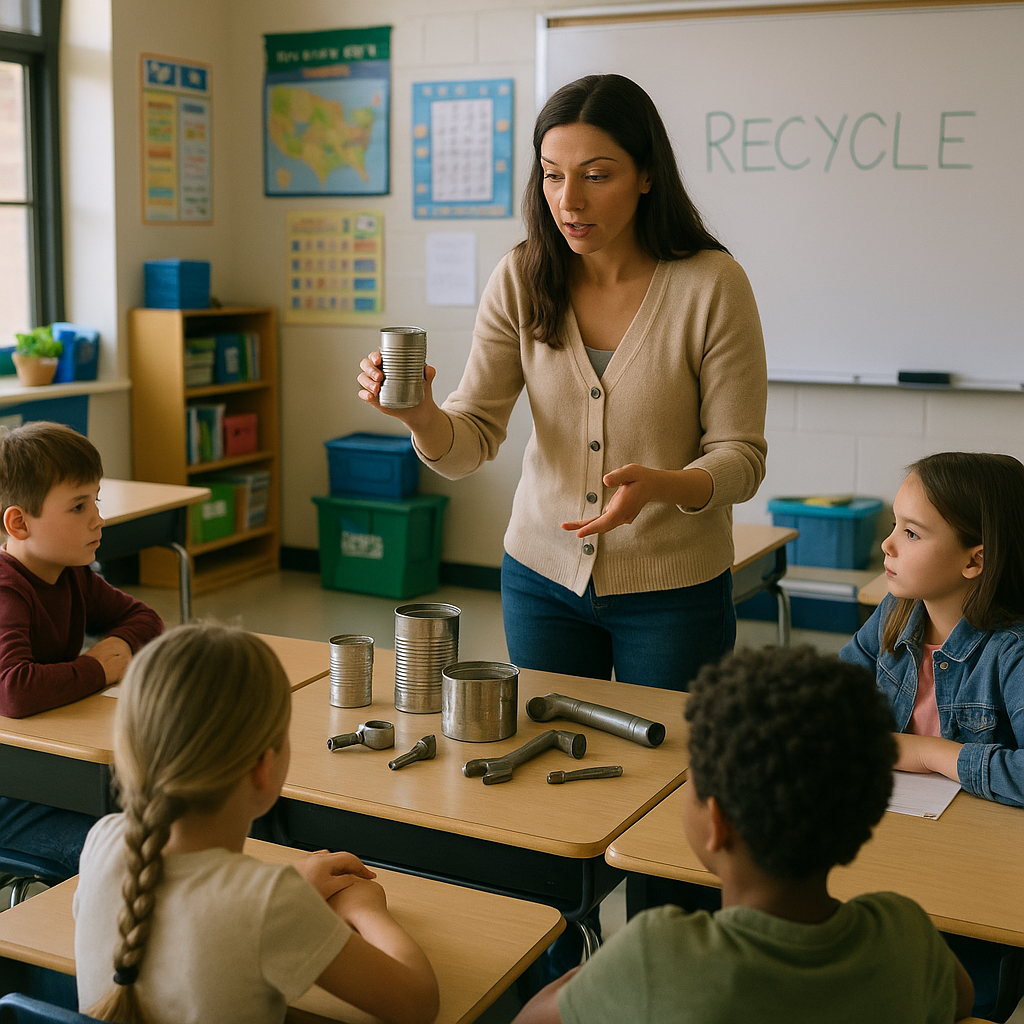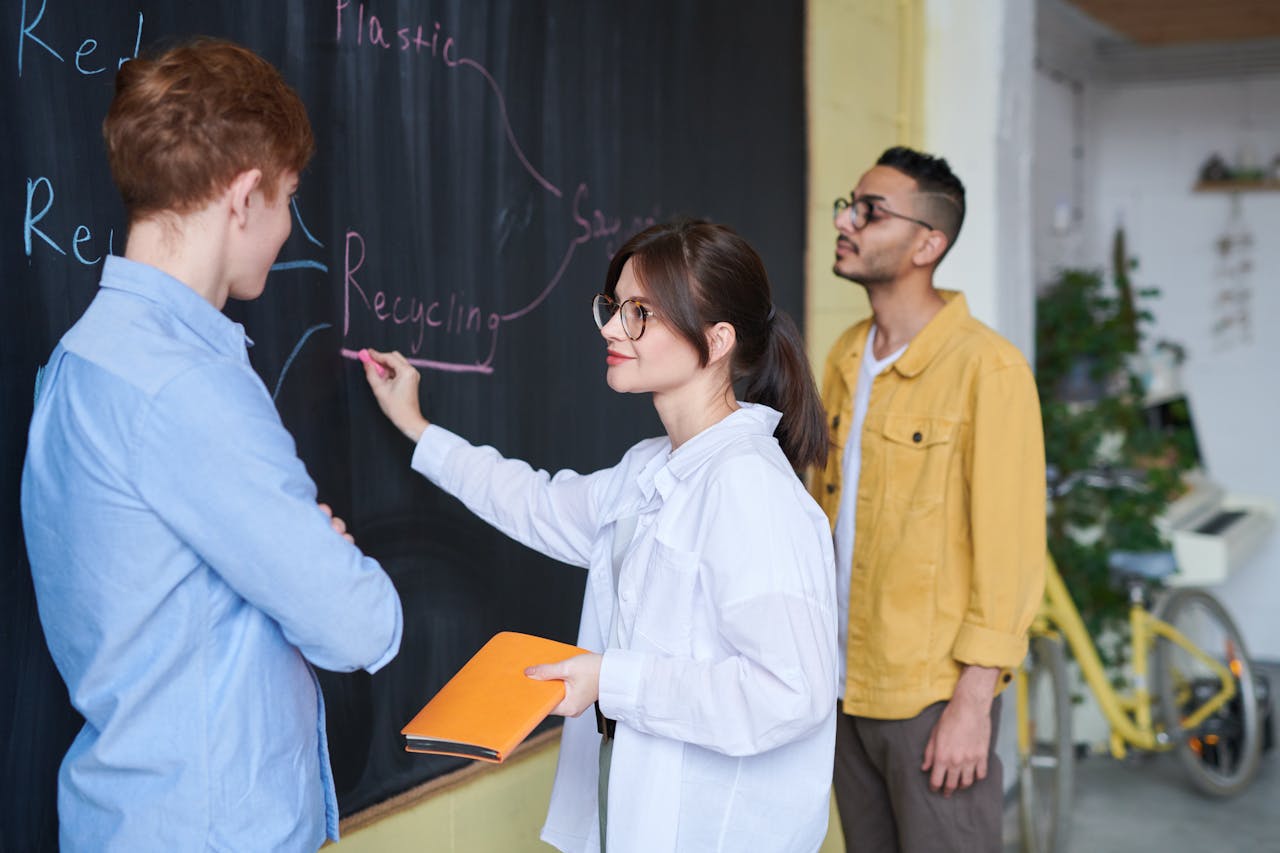5901 Botham Jean Blvd, Dallas, TX 75215
What Are Scrap Metal Recycling Education Initiatives?
June 4, 2025Scrap metal recycling education initiatives are structured programs designed to inform communities about the value and methods of responsible metal waste management. These initiatives simplify complex environmental concepts, making sustainable practices more accessible for everyone. From school workshops to community seminars, these programs lay the foundation for environmentally conscious communities.
The core purpose of these initiatives extends beyond merely sharing information. They aim to foster lasting behavioral changes by demonstrating how individual actions contribute to broader environmental goals. For example, understanding that recycling a single aluminum can saves enough energy to power a television for three hours makes the concept of energy conservation tangible and meaningful.
These educational efforts serve as vital connections between recycling facilities and the communities they serve. By clarifying the recycling process and highlighting its environmental benefits, these programs transform passive observers into active participants in sustainable waste management. The success of these initiatives is evident in reduced landfill waste, conservation of natural resources, and strengthened community bonds through shared environmental values.
How Do Community-Based Programs Promote Scrap Metal Recycling?

Grassroots initiatives focused on community education and engagement are vital for advancing metal scrap recycling efforts. Local organizations encourage participation by creating accessible collection points and distributing materials that explain the importance of separating and preparing metals for recycling.
Schools play a significant role in these efforts. Many organize aluminum can collection drives where students bring used containers from home. Recycling experts note that the average employee consumes about 2.5 beverages per day at work, presenting substantial recycling potential when collected community-wide.
Community workshops offer hands-on learning experiences. These sessions demonstrate how to identify valuable metals and prepare them for recycling. Participants learn to distinguish between ferrous metals (containing iron) and non-ferrous metals like aluminum and copper, which often have higher recycling value.
Local businesses often partner with community groups to establish collection programs. Companies set up receptacles for employees to deposit metal items that would otherwise end up in landfills. These partnerships help businesses improve sustainability practices while aiding community organizations in raising funds through recycling.
Educational campaigns use various media channels to spread awareness about metal recycling benefits. These campaigns highlight how recycling conserves natural resources and reduces energy consumption compared to producing new metals. For example, recycling aluminum saves up to 95% of the energy required to create new aluminum from raw materials.
Community clean-up events target areas where scrap metal accumulates. Volunteers collect discarded metal items from parks, vacant lots, and other public spaces, beautifying neighborhoods, preventing environmental contamination, and recovering valuable resources for recycling.
Recycling clubs transform occasional scrap drives into ongoing efforts. Members meet regularly to plan events and share best practices for recycling. These clubs build social connections while working towards environmental sustainability.
Many communities create incentive programs to boost participation. Some offer recognition for top collectors or small rewards for consistent involvement. Others highlight how proceeds from recycling can fund community improvements like playgrounds, gardens, or education programs.
Local government partnerships are essential to successful recycling initiatives. Municipalities often provide infrastructure support, such as transportation assistance or temporary storage facilities for collected materials, creating efficient pathways for recyclables to enter processing channels.
Success stories shared within the community motivate continued participation. When residents see how their efforts benefit both the environment and local organizations, they are more likely to maintain their commitment to recycling programs.
Community education efforts emphasize the environmental impact of recycling. Participants learn that recycling reduces landfill contributions and decreases the need for environmentally damaging mining operations, transforming recycling into a meaningful environmental action.
Strategic placement of collection points maximizes participation. Successful programs locate drop-off sites in convenient areas with clear signage. Some communities implement mobile collection services that visit neighborhoods on a rotating schedule to make recycling more accessible.
| Benefit | Description |
|---|---|
| Conserves Natural Resources | Recycling reduces the need to mine or extract new materials. |
| Reduces Energy Consumption | Recycling metal uses less energy compared to mining and manufacturing new metal products. |
| Minimizes Waste | Metal recycling reduces the amount of waste sent to landfills. |
| Creates Jobs | Recycling programs contribute to local economies by providing employment in collection, sorting, and processing. |
| Supports Local Economy | Local recycling operations create direct jobs in sorting, processing, and transportation. |
| Promotes Community Engagement | Programs provide educational opportunities and raise environmental awareness. |
What Role Do Schools Play in Scrap Metal Recycling Education?

Schools across the country have launched creative projects related to scrap metal recycling that combine education with hands-on fun. These initiatives provide students with practical knowledge about sustainability while fostering creativity and problem-solving skills.
In Oskaloosa, Iowa, students participated in an innovative scrap metal art project where they received 5-gallon buckets filled with metal scraps. Working alongside adult mentors, they transformed these materials into functional and decorative pieces displayed throughout the community. The program taught students valuable skills in metalworking while emphasizing that discarded items can find new purpose.
Similarly, in Knoxville, Tennessee, students from Green Magnet Academy visited a local metal fabrication shop as part of their STEM education. At Petty Welding, they received scrap metal pieces and the freedom to create whatever they envisioned. The experience showed them that metalwork is both a traditional craft and a viable profession while demonstrating the creative potential of materials often considered waste.
University of Tennessee students participate in an annual exhibit called “The Art of Recycling.” This program sends students to a local steel mill where they collect up to 3,500 pounds of metal scraps. These materials are transformed into sculptures displayed at the Knoxville Convention Center. This initiative provides a powerful visual demonstration of how seemingly worthless materials can become impressive works of art.
Beyond artistic endeavors, many schools organize metal collection drives where students gather aluminum cans and other scrap metals. These activities teach resource conservation while showing how recycling reduces landfill waste and prevents soil and water contamination from metal toxins.
Field trips to recycling centers offer another educational opportunity. Students witness firsthand how metals are sorted, processed, and prepared for reuse. They observe recycling professionals at work, learning that the industry creates jobs while benefiting the environment. These visits help students understand the complete recycling journey and the importance of proper waste sorting.
By introducing recycling concepts through engaging projects, schools help establish positive lifelong habits. Students learn to identify recyclable metals in their homes and understand why these items shouldn’t end up in landfills. The lessons extend beyond the classroom, empowering students to become environmental advocates within their families and communities.
These educational initiatives demonstrate the power of experiential learning in environmental education. Rather than simply telling students about recycling benefits, schools are showing them through creative, hands-on activities that make sustainability both accessible and appealing.
Conclusion: The Impact of Education on Scrap Metal Recycling

Education initiatives have greatly advanced scrap metal recycling in communities and industries. Through awareness programs, school curriculums, and community engagement, these efforts are encouraging a cultural shift toward sustainability. The economic benefits are significant, as recycling education reduces the demand for raw materials and creates jobs in the collection, sorting, and processing of recycled metals.
As more individuals, businesses, and organizations learn about proper recycling practices, we move closer to a true circular economy that prioritizes resource conservation and environmental protection. The effects go beyond immediate waste reduction to include innovations in recycling methods, sustainable manufacturing processes, and a stronger collective commitment to preserving our planet’s resources. For personalized guidance on your metal recycling needs, contact Okon Recycling at 214-717-4083.
